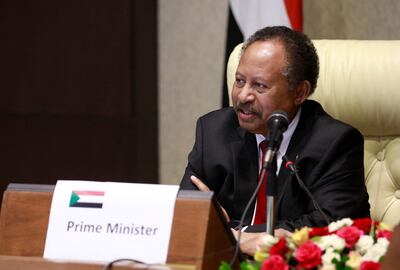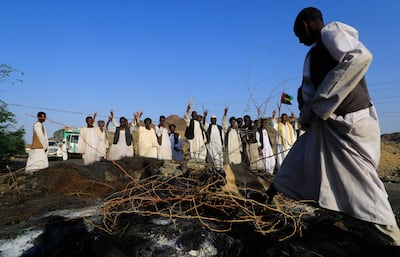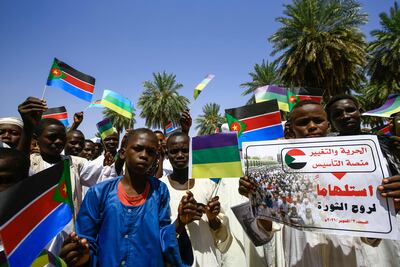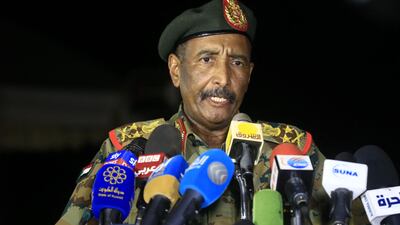The quarrel between Sudan’s military and pro-democracy politicians has highlighted the fragility of the transition to democratic rule in a country that has grappled for decades with civil strife, famine, sectarianism and ethnic and religious disparities.
The competition for power by Sudan’s military and its civilian politicians has defined the country’s political landscape for decades.
In the 65 years since independence in 1956, army generals have ruled for more than 50 years, toppling freely-elected but dysfunctional governments but often failing to deliver on what they promised, from ending civil wars and improving the woeful economy to redressing ethnic and regional inequalities.
Of the nearly two dozen coups and coup attempts over the past six decades, three led to lengthy stints of military rule. Those were in 1958 (six years), 1969 (16 years) and 1989 (29 years). On the other hand, pro-democracy uprisings have ended military rule in 1964, 1985 and lastly in 2019.

Sudan’s military, like most of its counterparts in the Middle East and Africa, is the land’s most powerful institution, with unmatched firepower and extensive economic interests that operate outside civilian oversight.
The military also sees itself as the nation’s ultimate “guardian,” a notion rejected by pro-democracy politicians as overstating the role of the military.
After the 2019 overthrow of Sudan’s last military dictator, Omar Al Bashir, the nation’s main pro-democracy alliance and the military entered a power-sharing deal that provided for a 39-month transition period.
That was extended by 14 months last October, after the government signed a peace deal with rebel groups in the west and south of the country. The deal provides for a general to be the country’s de facto head of state in the first half of the transitional period.
A civilian should then take over, but the date of transfer has been the subject of some controversy that the Justice Ministry has been asked to resolve.
The transitional administration is unique in that it brought together the country’s traditional arch-rivals for the first time since independence. The deal was warmly received by many Sudanese, who hoped that the unprecedented military-civilian alliance would be in a unique position to tackle the country’s many woes.
The optimism, however, soon gave way to despair as simmering tension between the two sides spilt over into the public sphere after a failed military coup attempt on September 21. Ugly and bitter, the mudslinging match that followed served as a wake-up call for the optimists among Sudan’s 40 million people.

What do they differ on?
The two sides aired their differences in public for the first time after last month’s coup attempt, casting a dark shadow on the future of the transition.
Here are their main points of contention:
The politicians say that the military and security agencies are not doing enough to deal with a dramatic spike in street crime in Khartoum and other major cities.
More recently, they said the military has done nothing to lift a blockade by protesters in eastern Sudan of the motorway linking Port Sudan, the country’s main seaport on the Red Sea, and the rest of the country.
The blockade is enforced by activists who complain the government signed a peace deal last October with politicians from the region who no longer wielded any influence on the ground.
The military responded to the charges of inaction by saying it was the duty of the police to lift the blockade, which had already led to a shortage of subsidised bread.

The military says politicians have been abusing their authority, appointing supporters rather than technocrats in government positions.
The politicians also stand accused of not paying enough attention to the economic hardships endured by the majority of the Sudanese. The irreverence shown to the military by politicians and activists, says the military, may have encouraged the latest coup attempt.
The politicians respond by saying the economy is showing signs of recovery, citing a slight drop in the country’s three-digit inflation and the relative stability of the local currency against the US dollar.
Both sides accuse each other of encroaching on their authority, with the politicians claiming that Gen Abdel Fattah Al Burhan, the country’s de facto head of state, was going it alone in foreign policy and has been acting in a presidential manner, rather than as the largely ceremonial leader he should be.
The politicians believe the military and security agencies remain packed with Islamists loyal to the Al Bashir regime and need to be restructured and purged.
The military responds that the politicians are way too zealous in their drive to weed out Al Bashir loyalists. They say that while a state agency mandated to dismantle the dictator’s legacy and led by one of the politicians was firing Al Bashir loyalists and seizing their assets, the politicians were creating a new legacy of corruption and abuse of authority.


